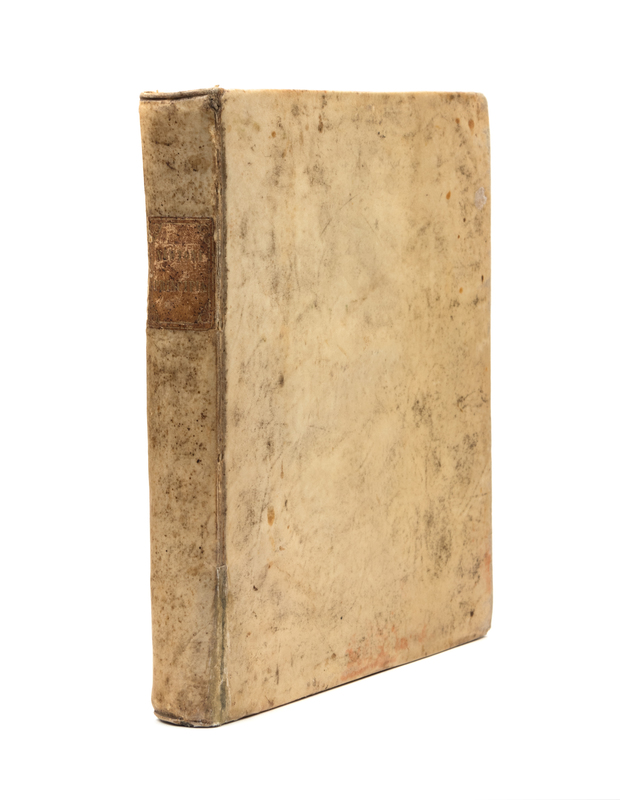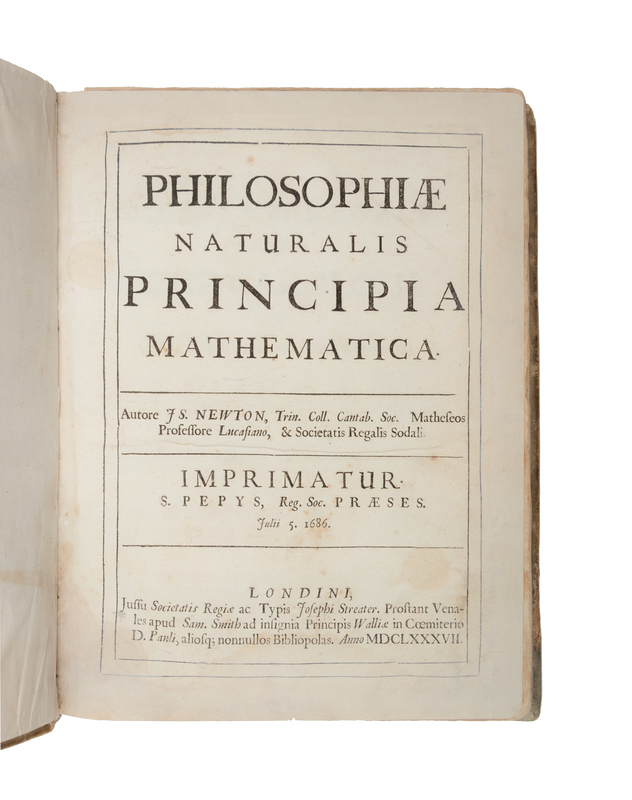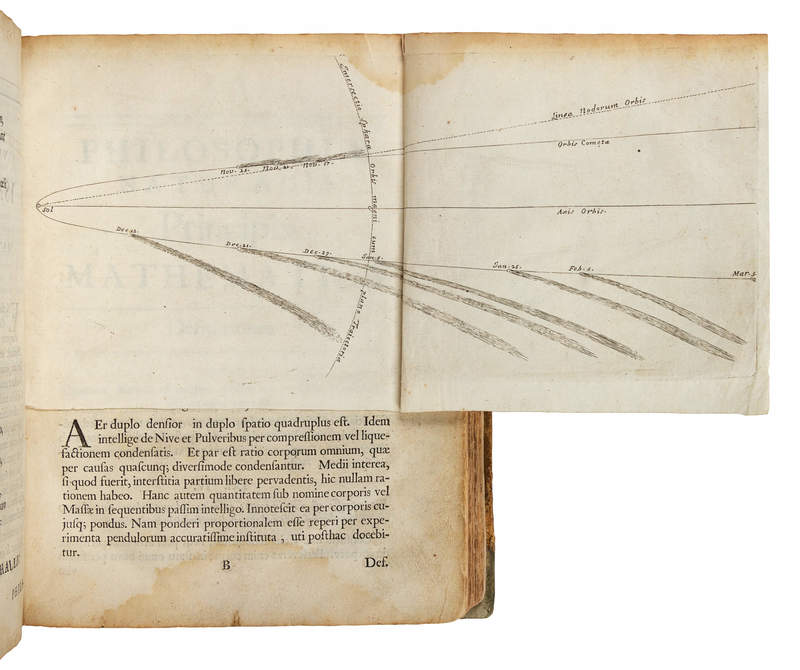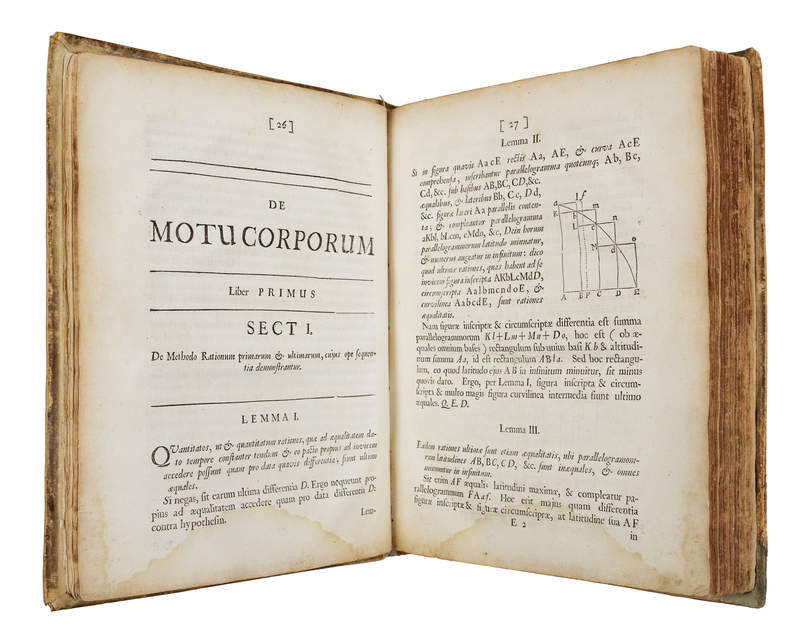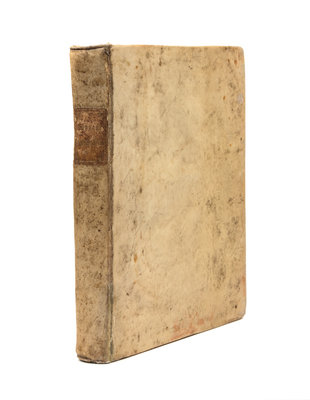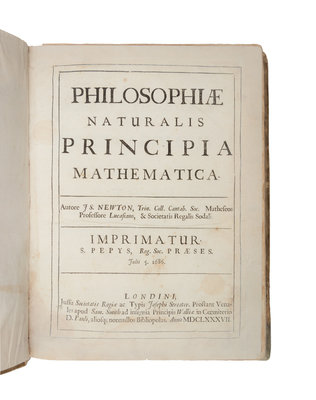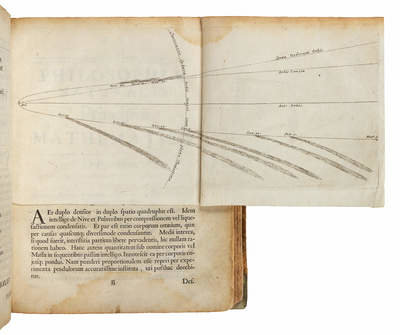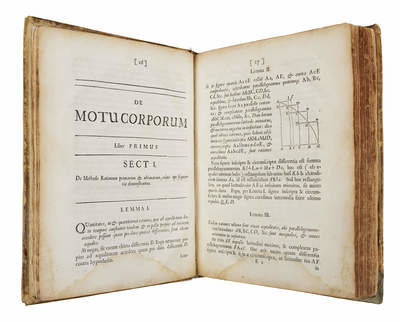Condition Report
Contact Information
Auction Specialist
Lot 61
NEWTON, Isaac, Sir (1642-1727). Philosophiae naturalis principia mathematica. [Edited by Edmond Halley (1656-1743)]. London: Joseph Streater for the Royal Society [at the expense of Edmond Halley], to be sold by Samuel Smith and other booksellers, 1687. FIRST EDITION.
Sale 714 - Library of a Midwestern Collector
Nov 5, 2019
10:00AM CT
Live / Chicago
Own a similar item?
Estimate
$150,000 -
250,000
Price Realized
$212,500
Sold prices are inclusive of Buyer’s Premium
Lot Description
NEWTON, Isaac, Sir (1642-1727). Philosophiae naturalis principia mathematica. [Edited by Edmond Halley (1656-1743)]. London: Joseph Streater for the Royal Society [at the expense of Edmond Halley], to be sold by Samuel Smith and other booksellers, 1687.
Median 4to (243 x 189 mm). 252 leaves and folding plate. Title in second state, cancelled; P4 cancel correcting orientation of the diagram on verso, errata inserted at end +/- Ooo4); engraving of cometary orbit inserted before B1. Numerous woodcut diagrams in text. (Title-page with outer margins restored and a portion of rule border in pen facsimile, internal tear or paper flaw crossing text on Ll1, marginal paper flaws on three leaves, 13 leaves with small wormtrack lower margin, some slight marginal browning.) Contemporary vellum, tan calf lettering-piece gilt (some minor soiling); quarter brown morocco folding case. Provenance: H. Pelham (signature on pastedown); Easton family (presumably Walter Easton or his family, Osborne Road, East Fremantle, Australia, signature pastedown).
“THE GREATEST WORK IN THE HISTORY OF SCIENCE” (PMM).
FIRST EDITION, Continental issue (three-line imprint). One of the most important works in the history of science, "perhaps the greatest intellectual stride that it has ever been granted to any man to make" (Einstein). Two apparently concurrent issues can be distinguished, identified by their title in uncancelled or cancelled state. One was distributed by Halley and Newton themselves through a number of unnamed booksellers, the other was largely turned over to Samuel Smith for distribution on the Continent (as here). This Continental issue is considerably rarer.
The Principia clarifies the universal physical laws of gravitation and motion which underpin phenomena described by Newton’s predecessors Copernicus, Galileo, and Kepler. He establishes the mathematical basis for the motion of bodies in unresisting space (the law of inertia), the motion of fluids and the effect of friction on bodies moving through fluids, and sets forth the law of universal gravitation and its unifying role in the cosmos. "For the first time a single mathematical law could explain the motion of objects on earth as well as the phenomena of the heavens... It was this grand conception that produced a general revolution in human thought, equalled perhaps only by that following Darwin's Origin of the Species” (PMM).
In addition this copy has the following points: watermark (Heawood 626) present in signatures P-2K, but not discernable anywhere else; p.22 woodcut corrected; p.29 catchword is "vel"; p.51 signature is G2 (not H2); p.65 correctly paginated; p.72 correctly paginated, last line "punctum" and catchword "Scho-"; p.91 signature is N2; p.110 last line begins "fecet Ellipsin..."; p.209 signature is Dd; p.261 paginated “262”; p.267 signature is Ll2); p.481 catchword is "c2,"; Errata leaf at end (3O4) a cancel. Babson 10; ESTC R33627; Grolier Science 78 ("THE MOST INFLUENTIAL SCIENTIFIC PUBLICATION OF THE SEVENTEENTH CENTURY"); Norman 1586 (3-line imprint title); PMM 161; Wallis 6; Wing N-1048.
